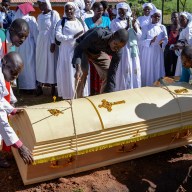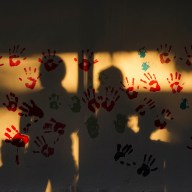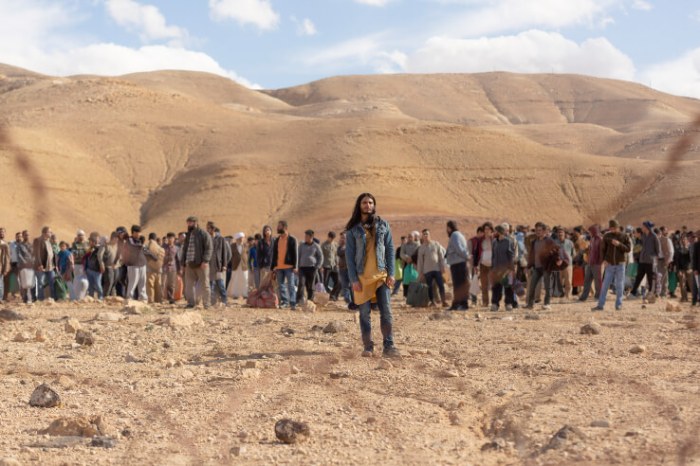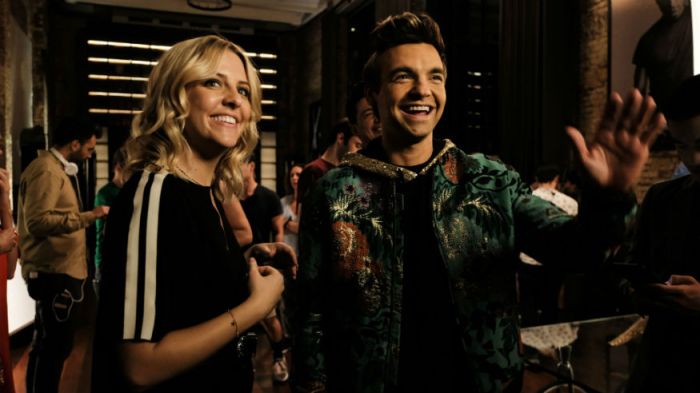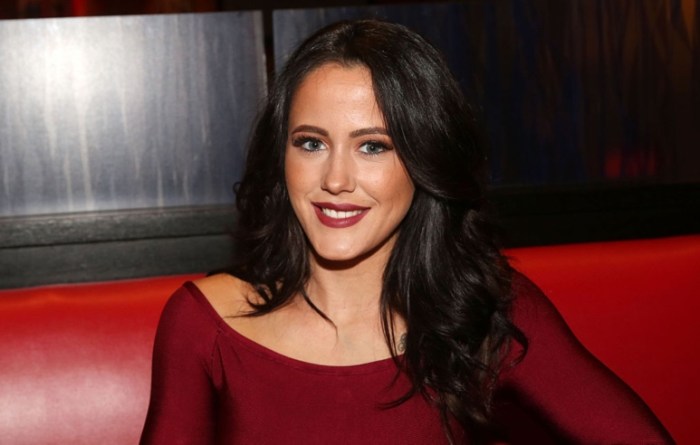New York City can have an odd sense of humor. Perhaps it was in honor of “Cutthroat Kitchen” host Alton Brown that it decided that trying to sabotage this interview would be amusing. As a fellow straphanger when he visits NYC, Brown knows that every subway trip could turn into a Cutthroat Commute. In this, he says, cooking and commuting are not so different.
“So many people who watch ‘Cutthroat Kitchen’ don’t necessarily get that the most fun part of it is simply watching the adaptability of human beings,” he says. “It’s not about doing horrible things to one another; it’s about how people clear their mind of problems and watching how people actually figure stuff out.” This summer, Brown took his show outdoors — something he’s very familiar with — in “Camp Cutthroat,”with sabotages like cooking on a rock wall and something called “capture the cheese.” We talked to Brown about the value of camping and hacking his kitchen tools — in elementary school.
You were uniquely prepared for “Camp Cutthroat” — you used to be a Boy Scout.
I was a Cub Scout, I was a Weebalo (horrible name!), I was a scout up to Star Scout. Then my family moved and I never found a troupe again, so I never made Life or Eagle, which I regret. But when I was a kid growing up mostly in the ‘70s in a relatively remote part of the United States, scouting was a way of life. One day a week you wore your uniform to school with your trusty scout knife on your hip. We learned a lot about self-reliance, which I worry that our kids aren’t learning today. I certainly started developing a love of cooking in the Scouts, and the kind of little travel pots and pans and things they make for Scouts, I was really addicted to that stuff, I kept mine in perfect order and hacked some of it and made changes on it to make it more useful. The nice thing about cooking outdoors on scouting trips is there wasn’t a mom yelling at you about messing up the kitchen! That was a formative experience. And in fact, when we decided to do ‘Camp Cutthroat’ and they were talking about my costume, I was like, ‘I’m going to wear a red beret,’ because I had a red Boy Scout beret that I wore in the mid-‘70s that I thought made me look badass. I told them, ‘I am so rocking that beret.’ Wait, how old were you when you started hacking kitchen equipment?
I started as a Cub Scout in third grade, and by the time I moved into those awkward Weebalo years I was already bending things, and I made an adaptation to one of my pots so the handle could be screwed on to a walking stick so you could set it up in the fire better. I took some metal tent parts to make a little tripod to dangle a pot over a campfire. So I was already showing signs of MacGyverism — nobody had to tell me to make hobo packs, I kind of automatically knew to wrap things up in aluminum foil and stick them down in the fire. A lot of this was actually born not from scouting as much as, my father died when I was quite young, when I was 10, and my mom would try to pack food in my scout pack for me. And inevitably I would set off on 20-mile hikes with 50 pounds of canned food, so I got in the habit of taking that food out and donating it to this church, and I’d go off in the woods with a pack of gum and some beef jerky. And so I learned how to catch fish, learned how to forage for mushrooms — I started early. Necessity is the mother of invention. A lot of people were doing that back then. Knowing how to fish and forage at least a little bit used to be standard man skills — I don’t say that to be sexist, but at the time, that was something that guys knew how to do unless you lived in a city. You knew how to catch fish because your dad or somebody taught you; you catch crawfish in a creek, you knew what to pick from trees. Was “Camp Cutthroat” your idea?
I don’t remember who first said ‘Camp Cutthroat’ but I remember that the second it came out I was like, ‘Oh my gosh, I spent so much time outdoors as a kid.’ You immediately have these emotional and nostalgic associations of what that means, what it’s gonna look like, and I immediately said, ‘Oh, we should make that look like the movieMoonrise Kingdom,’ with this kind of very nostalgic Boy Scout kind of feel and create this kind of world that people either remember or wish they remembered. RELATED:What if Wes Anderson had directed X-Men? I’ve been yearning for the ability to do sabotages that were outdoors — fire-related things, things that could be very very tall or very very large, or involve things like lakes. We literally wrote everything we needed for the five-show run in a one-hour brainstorming session. It was so rich with possibilities, from rain machines to wind machines to having to fish in a lake to canoes and bears — it was obvious. Had to do it. It was a have-to-be project. What can’t you go camping without?
If we’re on a multi-day hike, I’m gonna be carrying pretty specialized gear designed specifically for that because weight and fuel are big issues — I’ve got titanium pots and pans for that. But for just regular camping, stuff that I always have with me is a cast-iron Dutch oven that I camp with and bake biscuits in — of course that’s heavy, so I don’t want to be far away from the car. I’m a huge fan of heavy-duty aluminum foil — I never go anywhere without heavy-duty aluminum foil — and I have a very nice camp shovel that I’ve turned into kind of a multi-tool for various things when cooking. And gosh darn it a big ol’ Swiss army knife because you still can’t beat it. You’re making the shows, you did the tour last fall — do you get to be in a kitchen much for yourself?
I try to cook every day. When I’m home, I cook every day. When I’m, like now, in Los Angeles for five weeks, making ‘Cutthroat Kitchen’ I don’t stay in hotels, I stay in little rental houses and I have a little kitchen kit that I bring with me so I can cook. If I go a couple of days without being actively in the kitchen cooking for myself, I get a little cranky. It’s a big self-identifying kind of thing, I have to do it. I’m not saying I’m doing it at a really high level—stirring yourself up some eggs in the morning doesn’t seem like a really big deal, but it keeps me sane. I do have a very very difficult time not cooking. I was out on tour with my live show, the Edible Inevitable tour, and I did a lot of culinary stuff in that live show, but the high point of my day was actually going back to the bus at night and mixing up the batches of dough for the next day’s demos, that kind of restful I get my hands in some flour, I’m gonna mix this up, I’m gonna knead the bread, that’s the best part of my day. Boy Scouts have a reputation for being helpful. Do you ever have to stop yourself from helping a contestant?
Every day. When people are in the fog of war, as we call it, it is so easy to miss obvious answers that are right in front of you. And it drives me crazy. In fact, it just happened that we are just wrapping up another season of ‘Cutthroat Kitchen’ here in Los Angeles, and just yesterday I literally had to bite down on a wooden spoon to not go in and show somebody something. I think it’s a natural inclination that people have. Professional kitchens are run on helping each other, you gotta have each other’s back, so it’s built into us that when one person founders, you simply help and move on, and when you can’t do that, it’ll drive you crazy, and it does. I have to walk away a lot because I know I can’t help them. Do the “Cutthroat” shows make chefs better?
We’ve been on long enough to where I actually do run into these people out in the world, and I can think of three specific cases when chefs have told me that it was life-changing and they didn’t expect that. Because when something bad happens, they’ll either say, ‘It’s not as bad as ‘Cutthroat Kitchen.’ Or they’ll say, ‘If I can get through the miniature kitchen or cook on a candle, I can get through this.’ We do all get set in our ways as far as, ‘I’ve got to have this and I’ve got to have that,’ but you don’t always have to. I think it’s a great training ground for problem solving, which is basically kind of what life is about, and above all turning liabilities into assets, that is so huge to look at anything that looks like doom and say, ‘Ah, you’re an opportunity, and I’m going to take advantage of this opportunity.’ Hack “Cutthroat Kitchen” for us.
Make sure you get flour and eggs out of the pantry — and don’t freak out.
‘Camp Cutthroat’ is Alton Brown’s childhood in Wes Anderson hues
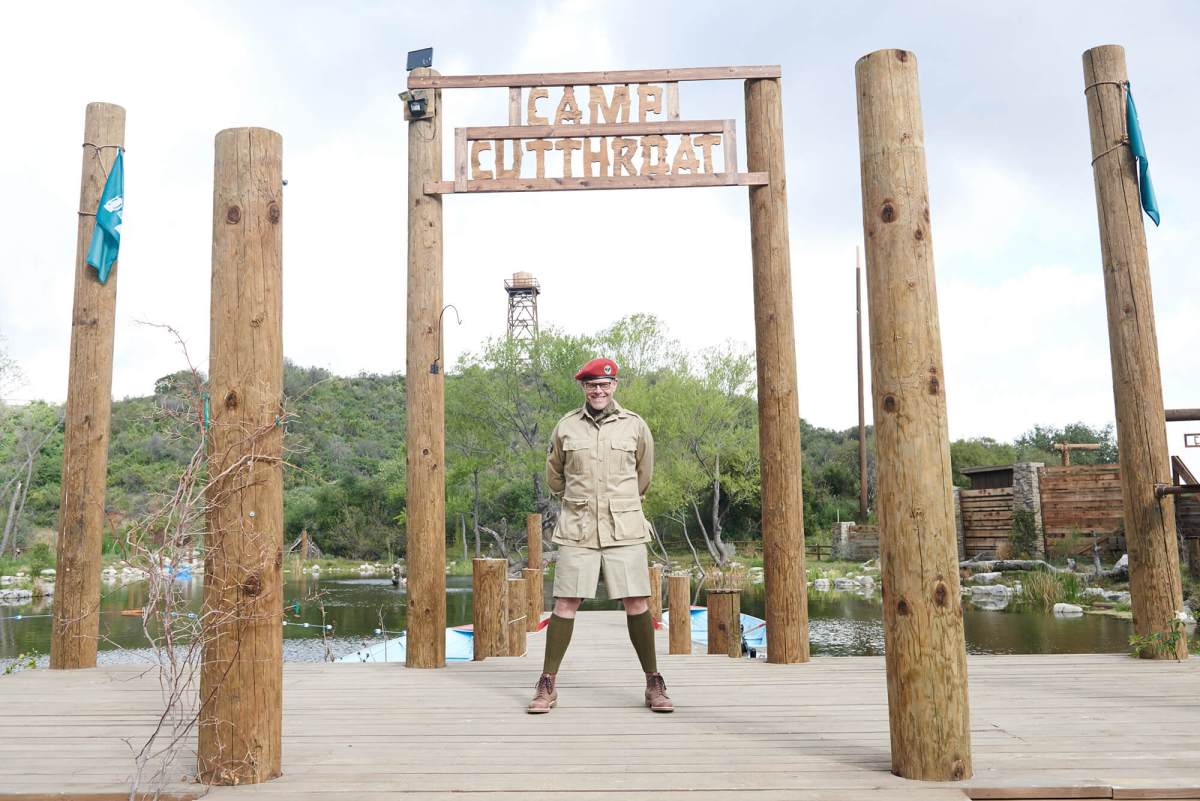
Food Network







